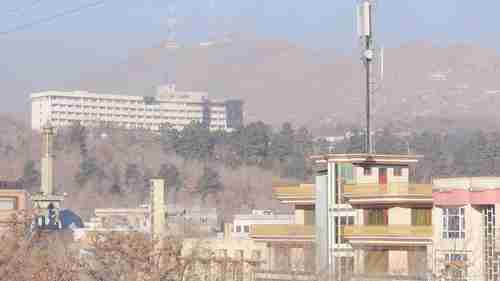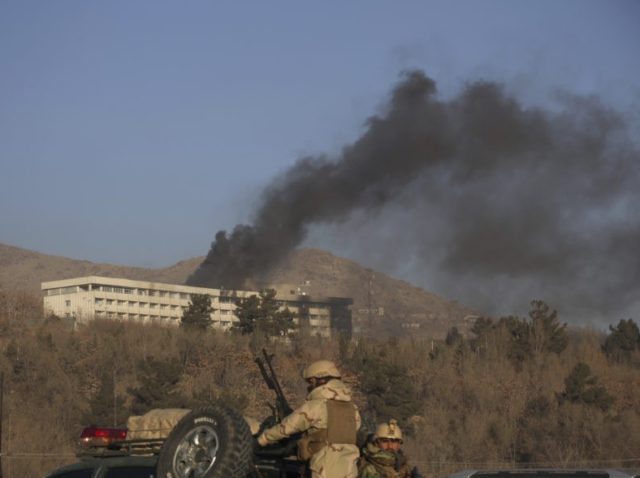This morning’s key headlines from GenerationalDynamics.com
- Multiple Afghanistan Taliban terror attacks leave ‘victory’ plans in tatters
- Sunday’s attacks throw new doubts into claims of ‘victory’ in Afghanistan
Multiple Afghanistan Taliban terror attacks leave ‘victory’ plans in tatters

The enormous Kabul Intercontinental Hotel that was under attack for 16 hours this weekend (Tolo News)
The claims by the Afghanistan government and the US-led coalition forces that the Taliban is finally under control were completely undermined this weekend by three separate terrorist attacks by the Taliban.
The most spectacular of the attacks was a 16-hour siege of the Intercontinental Hotel in the capital city Kabul. Attackers dressed in army uniforms and armed with automatic weapons stormed the hotel on Saturday evening. They sprayed the areas with bullets and forcibly entered some rooms and killed the people inside.
Social media showed parts of the building catching fire, after which guests tied sheets together to escape from their rooms.
Afghan security forces fought the attacks in a gun battle that lasted well into Sunday. Afghan government officials say that four Afghan civilians and 14 foreigners were among those killed. Other reports indicate that the death toll was well over 30.
A Taliban spokesman, Zabihullah Mujahid, claimed credit for the attack, saying, “Our five fighters, Bilal, Ayubi, Khalil, Bashar, and Abid entered the building and conducted the operation that resulted in the death of 10 foreigners and Afghan government officials.” However, Afghan government officials say that there were only four attackers.
This was not the only Taliban terrorist attack to occur on Sunday.
In Balkh province in northern Afghanistan, the Taliban claimed credit for an attack that killed 18 Afghanistan militiamen on Sunday.
In Herat province in western Afghanistan, eight people were killed by a roadside bomb. No one claimed credit, but it is assumed that the Taliban were responsible. The Taliban were probably targeting police or the Afghan military, but since the eight people killed were ordinary civilians, the Taliban would want to avoid the bad publicity of claiming credit.
There is one thing about Sunday’s attacks that I found very interesting: That there were no claims of credit from the so-called Islamic State (IS or ISIS or ISIL or Daesh). Usually, a militia in the Taliban carries out these terror attacks, and then the ISIS public relations agency, Amaq, claims credit for the attack, even though ISIS was not involved and probably did not even know it was going to happen until the read about it online. Now that ISIS has been defeated in both Syria and Iraq, and the “Islamic State” brand name has been thoroughly humiliated, it may be that the Amaq PR agency is no longer in business. At any rate, Taliban terror groups that used to vow allegiance to ISIS are apparently now back to being just plain, old Taliban terror groups. Tolo News (Kabul) and Fox News and Al Jazeera and Reuters
Sunday’s attacks throw new doubts into claims of ‘victory’ in Afghanistan
As I have been writing for years, based on a Generational Dynamics analysis, a “victory” in Afghanistan is impossible. Afghanistan’s last generational crisis war was the extremely bloody Afghan crisis civil war, 1991-96, which mostly pitted the ethnic Pashtuns, who are Sunni Muslims and later formed the Taliban, versus the Northern Alliance of Tajiks, Hazaras, and Uzbeks in northern Afghanistan. Now, twenty years later, Afghanistan is in a generational Awakening era, and a new young generation of Pashtuns is coming of age, raised on stories their parents told them about the atrocities committed by the Northern Alliance, and they’re looking for revenge.
There is absolutely no way that this new young generation of Pashtuns is going to enter into any “peace process” with representatives of the hated Northern Alliance, brokered by the old geezers in the Kabul government, supported by the United States. The whole concept of such a “peace process” is so completely ridiculous and absurd that you’d have to be a full-time resident of Fantasyland to think that it’s possible.
So the Taliban attack on the International Hotel in Kabul on Sunday was intended to destroy the credibility of the Afghan government and the US-led coalition, and it undoubtedly succeeded.
A massive car bombing in Kabul in July of last year killed 36 and wounded dozens more. It was an attack on the ethnic Hazara community in Kabul, and the Hazaras were one of the ethnic groups in the Northern Alliance fighting the Pashtuns.
In August of last year, dozens of civilian men, women, and children, mostly Hazara Shia Muslims, were massacred in a two-day gun battle in northern Afghanistan. About 50 people were shot and killed, 30 houses were torched and burned to the ground, several mosques were set ablaze, and an unknown number of villagers were taken hostage. Seven Afghan troops and 12 Taliban militants were killed in the fighting.
With regard to the two other attacks on Sunday, in Balkh province in northern Afghanistan and Herat province in western Afghanistan, news reports do not indicate what ethnic groups were targeted, but it is almost certain that the targets were government forces or Northern Alliance ethnic groups.
These kinds of attacks are not going to stop. In fact, as more and more members of this young Pashtun generation come of age, the attacks are going to increase.
As I wrote in an analysis last year, the Trump administration is probably well aware that there is no hope of any meaningful “victory” in Afghanistan, but they may have a larger purpose in mind. There are several American military bases in Afghanistan, including two air bases in Bagram and Kandahar International Airport. These bases will be valuable in any future war with China. So remaining in Afghanistan allows us continued use of those bases, as the war with China and Pakistan approaches.
This may be a similar strategy to the one that the US military is following in Syria. The US announced a “Border Security Force” (BSF) and a continuing commitment of forces to Syria to avoid repeating the 2011 Iraq withdrawal blunder without leaving any forces behind, allowing the rise of ISIS in Iraq. The US has backed off from the BSF, now calling it a kind of local police force, but its purpose is the same: to maintain a residual American force in Syria to prevent a resurgence of ISIS. The strategy in Afghanistan is similar: maintain a residual force in Afghanistan, not with the hope of defeating the Taliban, but with the ability to maintain and support valuable military bases.
This is an extremely complex strategy, but it makes a great deal of sense as war with China and Pakistan approaches. In the meanwhile, we should expect a lot more bad news. Khaama Press (Kabul) and Stars and Stripes and Tolo News (Kabul)
Related Articles
(08-Aug-2017)
- Kabul bombing brings back memories of bloody 1990s Afghan civil war (03-Jun-2017)
- Brief recent generational history of Afghanistan (25-Jul-2017)
- Dozens of Shia Muslims in Afghanistan killed in fourth Taliban victory in 3 weeks (08-Aug-2017)
- US in Syria announces a Border Security Force to prevent repeat of Iraq withdrawal blunder (16-Jan-2018)
KEYS: Generational Dynamics, Afghanistan, Kabul, Intercontinental Hotel, Taliban, Zabihullah Mujahid, Herat province, Balkh province, Islamic State / of Iraq and Syria/Sham/the Levant, IS, ISIS, ISIL, Daesh, Amaq public relations agency, Pashtuns, Northern Alliance, Tajiks, Hazaras, Uzbeks, Bagram, Kandahar International Airport, Syria, Border Security Force, BSF
Permanent web link to this article
Receive daily World View columns by e-mail

COMMENTS
Please let us know if you're having issues with commenting.